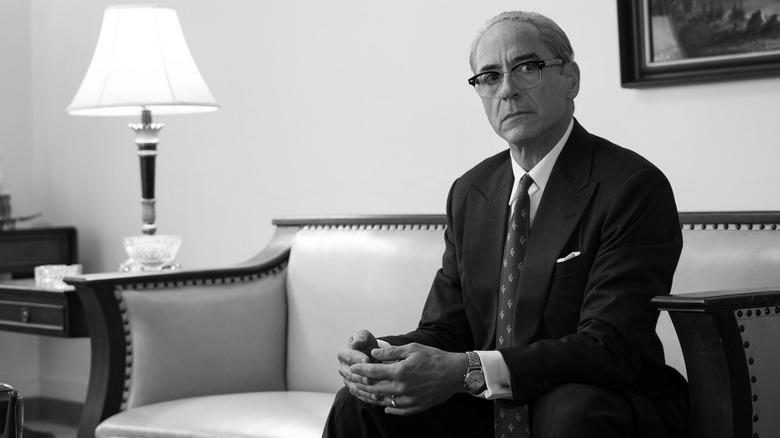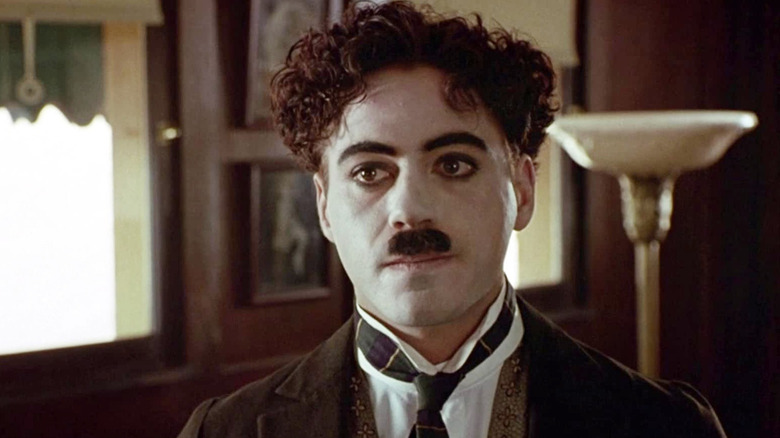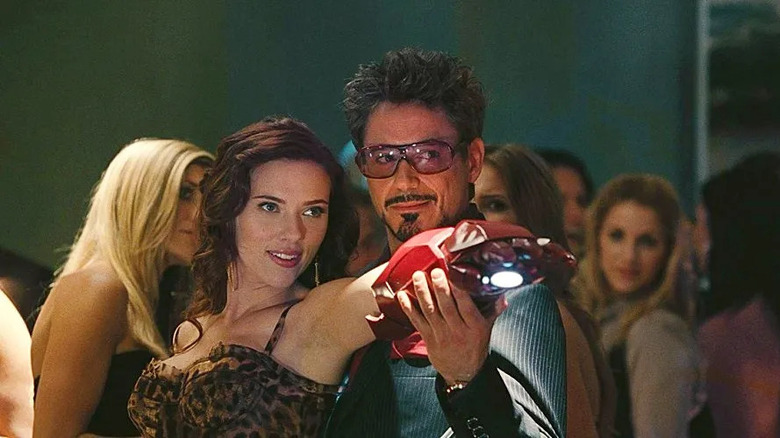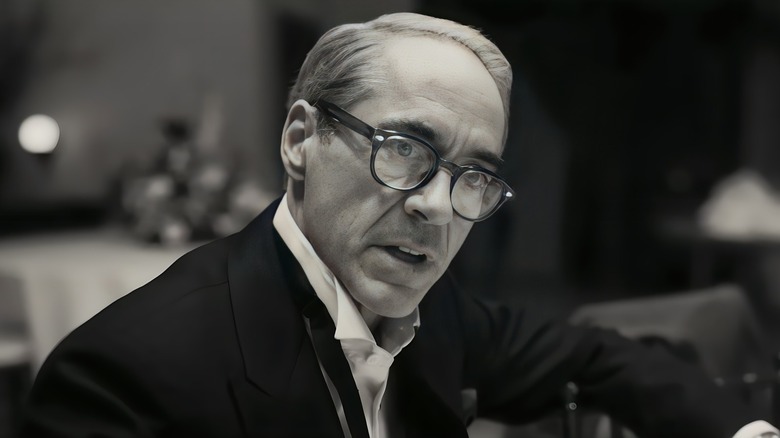Robert Downey Jr. Finally Won An Oscar, And It Was For The Right Role
It was, to paraphrase something a giant purple guy once said, inevitable. During the 96th Academy Awards ceremony, Robert Downey Jr. won the Oscar for Best Supporting Actor for his portrayal of Admiral Lewis Strauss in Christopher Nolan's "Oppenheimer." Although the fact that Downey Jr. has retained a relatively youthful appearance thanks to his pervasive charm and wry magnetism means that he doesn't quite feel like an "elder statesman" of the acting world, the actor has nonetheless enjoyed a lengthy 40+ year career in the motion picture business, and most of that career (on-screen, anyway) has seen him be continually praised by critics and fans alike as being one of the best actors working in film. With all of that in mind, his finally being awarded an Oscar feels like something that's been a very long time coming.
Although, on the surface, his win for "Oppenheimer" may seem like the sort of victory afforded to other longtime A-list stars who get overlooked for decades, there are several reasons why Downey Jr. has won for his performance as the one-time chair of the United States Atomic Energy Commission. Chief among them is the fact that the portrayal feels like the final missing piece in Downey Jr.'s body of work, with Strauss allowing the actor to demonstrate a shade and a depth within himself that he has shown certain sides of before, but never previously allowed to come forward with as potent a mix of venom and vulnerability. Yes, the actor has given several all-timer performances in his past, and created some indelible screen characters, but make no mistake: Lewis Strauss was the right role for him to finally take home the Oscar.
The comeback kid
Let's get the elephant out of the room right away: One of the reasons Downey Jr. was overlooked by the Academy for so long is likely due to his prior reputation as either a Hollywood bad boy or an addict in desperate need of help, depending on who you're talking to. Of course, the latter is the truth, but given the fact that the actor had issues with substance abuse very early on (beginning, tragically, with his father's enabling at the age of six), his public reputation began to be unsavory in the tabloid-crazy late-'80s and '90s — something which likely contributed to the fact that he didn't win for 1992's "Chaplin," even though he was nominated.
Although many fans believe the actor was snubbed for "Chaplin," for his part, Downey Jr. considers his loss a positive thing, saying in a recent interview on TV's "The View" that winning at the age of 28 "would have put me under the impression that I was on the right track." He certainly has a point; while winning for "Chaplin" would've been well-deserved, it could have seen the actor be overused (or poorly used) as so many young Oscar winners tend to be.
It also wouldn't have helped his underdog status. As he started to turn his life around, attended rehab and kicked his substance addictions, his star began to rise anew, with audiences re-discovering just how talented his was in films like Shane Black's "Kiss Kiss Bang Bang" and David Fincher's "Zodiac." Those two movies in particular led to his casting as Tony Stark in 2008's "Iron Man," a film that explicitly references the actor's journey of redemption in meta fashion and begins the era of "Robert Downey Jr., A-lister" in earnest.
Downey has long demonstrated his impressive range and adaptability
Setting aside his personal offscreen struggles, on-screen, the actor has built a remarkable body of work that was suffused with quality pretty much from its beginning. Perhaps one of the reasons the Academy neglected to recognize him before "Chaplin" is the fact that given his natural comedic timing, he was making a killing in a series of teen comedies during the 1980s, and comedy is a genre the Oscars routinely tend to overlook. Two of these performances alone demonstrate his fantastic range: You could be forgiven for not realizing that the guy playing the preppy jock bully in "Weird Science" was not the same dude who portrayed the counterculture New Wave weirdo in "Back to School."
As he began to move into more dramatic roles in the '90s, he made good on the notes of soulful melancholy and raw vulnerability he initially demonstrated in films like 1987's "Less than Zero." By the time "Kiss Kiss Bang Bang" was released, Downey Jr. had successfully fused his natural comedy with that vulnerability, meaning he could turn on a dime from devil-may-care quips to deep-rooted pain, anger, or determination. It's this blend of flavors that he brought to the role of Tony Stark, and not only would the Marvel Cinematic Universe have not started without him, it would never have reached the heights that it did without his involvement.
Consider the fact that he acted as unofficial brand ambassador for Marvel for years, sending the signal to audiences and industry people alike that superhero movies could both be fun and be taken seriously. Consider also that, after the heroic demise of the character in "Avengers: Endgame," the MCU has struggled mightily to fill the void the actor has left behind, and still hasn't been able to.
The ballad of Lewis Strauss
While Tony Stark may go down in history as RDJ's signature role, it's not the one he necessarily deserved to win an Oscar for (even though Marvel fans certainly hoped he would've been nominated for "Endgame"). As I said earlier, Strauss provides a "missing piece" to his repertoire in a lot of ways: It's a performance that's as surprising as it is expected, and it's that combination which made it so compelling for awards voters.
The way Nolan structures "Oppenheimer" means that Strauss is, in effect, the second lead of the film, so much so that the actor himself could make a case for Strauss as the movie's hero. One of the strengths of Nolan's film is that there aren't many clear-cut heroes or villains; certainly, the titular role of J. Robert Oppenheimer (Cillian Murphy) is the man who by extension killed thousands of people and endangered countless more with his role in creating the atomic bomb, and Strauss is a public servant who the actor described as "conservative for all the right reasons."
Yet, as the film demonstrates through his nuanced and vanity-free performance, Strauss ruined Oppenheimer's professional life as well as reputation by having him cancelled, all over a lingering enmity that he'd been slighted by the scientist in front of Albert Einstein (Tom Conti). The role of Strauss, as the man weaves his way through various levels of deception (of both those around him as well as himself), allows him to utilize his natural charisma while revealing a deep well of anxiety, pain, and narcissism within Strauss during his more private moments. "Oppenheimer" is a movie that is remarkably layered and consistently engaging, something a veteran of independent film as well as the MCU embodies perfectly. Lewis Strauss may or may not have gotten his due, but Robert Downey Jr. has certainly received his, and it's about damn time.



